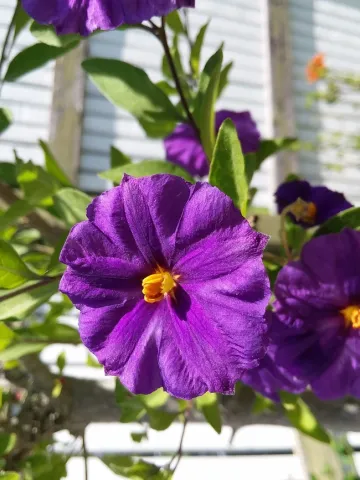
Blue Potato Plant
By Polly Nelson UCCE Master Gardener
Scientific name: Solanum rantonnetii
Planting area: USDA 9-11
Size: 5-8 feet tall, 3-5 feet wide
Bloom Season: spring through summer to late fall
Exposure: Full sun, partial shade in warmer areas
Water needs: regular
This sun-loving perennial produces unusual purple, 1-inch flowers instead of potatoes! The flowers have gold centers and form on new-growth branches with green leaves and a tendency to cascade. Small red berries follow the flowers. The plant can be in the ground, trained as a shrub, hedge, or shaped into a tree over time, lollipop-shaped or espaliered. Where frost or poor soil is an issue, this plant grows well in containers.
Plant in well-drained soil in a sunny location four feet in front of walls or fences. Dig a hole three times the width of the root ball. Place it in the hole and backfill with the excavated soil, tamping gently. Water thoroughly. Subsequent watering for in-ground and container plants should be applied when the soil is dry two inches below the surface. Place a mulch layer 4 inches deep, staying 4 inches away from the trunk, to keep soil evenly moist and discourage weeds. Too much irrigation promotes excess leaf production rather than flowers.
Increased leaf production at the expense of flowers can also be caused by too much nitrogen in fertilizer. Use a complete, balanced slow-release fertilizer in spring/summer or a liquid fertilizer. Follow label instructions for amounts and frequency.
Prune the plant back by one-third every fall or shape it into a tree to control growth, encourage blossoms, and maintain the desired shape. Wait for blooms to decline in the fall, or shear lightly to deadhead during the blooming season to encourage more flowers.
This plant attracts bees, butterflies and hummingbirds. It is deer-resistant, with its primary pests being aphids and thrips. Treat aphids with a water spray to remove; thrips may be sprayed with horticultural or neem oil if necessary. This plant can be toxic, so wear gloves when handling and don't allow pets and children to consume.

